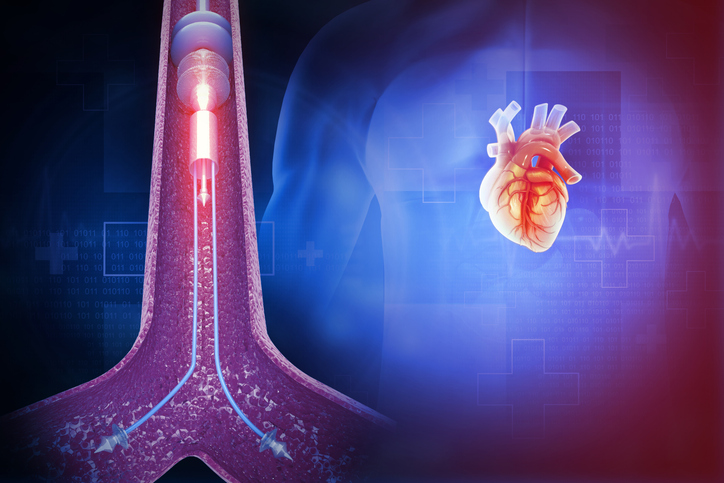
Advancements in mechanical circulatory support (MCS) devices for high-risk percutaneous coronary intervention (HR-PCI) have focused on achieving hemodynamic stability with minimal complications. The Impella device, a well-established transvalvular microaxial pump, is widely used and being actively investigated for supporting HR-PCI. Its use reduced all-cause mortality in patients with acute myocardial infarction-related cardiogenic shock, most of whom were treated with PCI, in the DanGer Shock trial. The cost was device-related complications, including more bleeding and limb ischemia in the Impella arm, emphasizing the need to develop safer mechanical circulatory support devices.
The Magenta Elevate is an innovative, expandable MCS device designed to address the limitations of traditional systems. It features a 9-Fr catheter-mounted microaxial pump that expands to 30-Fr within the left ventricle, providing high-output support. Delivered through a 10-Fr femoral introducer sheath, this device minimizes vascular trauma while offering flows up to 5.4 L/min. This expandable design allows for lower rotational speeds, potentially reducing hemolysis. In theory, this device is designed to provide adequate hemodynamic support with improved access-related safety profile and hemocompatibility.
The first-in-human study of the Magenta Elevate system, conducted by Schwammenthal et al., assessed its safety and efficacy in 14 patients undergoing HR-PCI, including interventions on unprotected left main coronary arteries. Device insertion, support, and removal were successful in all patients, although device malfunction in one required replacement with a new device. The device successfully maintained mean arterial pressure (MAP) and reduced left ventricular workload during a total of 20 prolonged left main balloon occlusions lasting an average of 39 +/- 16 seconds. MAP decreased by a median of only 7 mm Hg (7 mm Hg [13 to 2 mm Hg]; P < 0.001), while diastolic aortic pressure increased (7 mm Hg [4 to 10 mm Hg]; P < 0.0055), preserving myocardial perfusion. There were no hypotensive episodes and no need for vasoactive medications. There were no major device-related adverse events, and all patients survived to 30 days without significant complications.
Compared to existing devices like the Impella CP, which operates at higher rotational speeds and requires larger sheaths, the Magenta Elevate’s lower-profile delivery system is a meaningful advancement. Its ability to self-expand across the aortic valve enables robust hemodynamic support with slower rotational speeds to limit hemolysis and lower insertion profile to reduce access-related complications. Future studies are needed to confirm these findings in larger cohorts and explore the device’s application in cardiogenic shock and during more prolonged periods. For instance, the Impella CP’s larger 14-Fr access sheath allows single-access for PCI through the same access point, whereas the Magenta Elevate’s 10-Fr access requires a 2nd access point for PCI, which may counterbalance access-risks, particularly for patients in whom radial access is not an option.
Magenta Elevate system demonstrates a promising evolution in MCS technology, offering substantial cardiac support with reduced vascular complications. The investigational Impella ECP similarly provides LV-to-Aorta mechanical circulatory support through a 9-Fr access sheath utilizing an expandable flow pump. These innovative designs may expand the utility of MCS in interventional cardiology, ultimately improving outcomes for patients undergoing high-risk procedures.
References
Schwammenthal E, Gogorishvili I, Sievert H, Fefer P, Pinto DS. High-output mechanical circulatory support in left main interventions: the Magenta Elevate high-risk PCI first-in-human study. JACC Cardiovasc Interv. 2024;17(24):2851-2862. doi:10.1016/j.jcin.2024.09.017
Møller JE, Engstrøm T, Jensen LO, et al. Microaxial flow pump or standard care in infarct-related cardiogenic shock. N Engl J Med. 2024;390(15):1382-1393. doi:10.1056/NEJMoa2312572.







 © 2025 Mashup Media, LLC, a Formedics Property. All Rights Reserved.
© 2025 Mashup Media, LLC, a Formedics Property. All Rights Reserved.